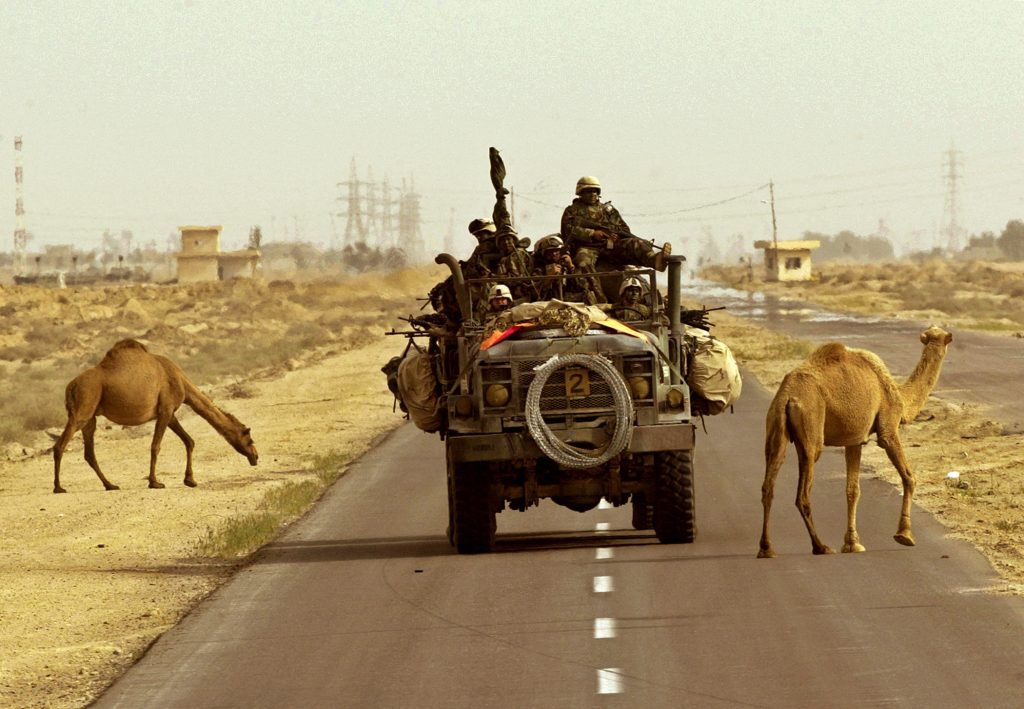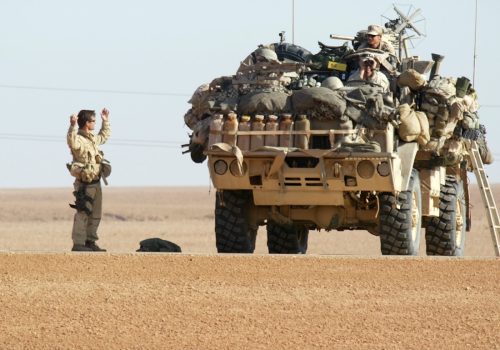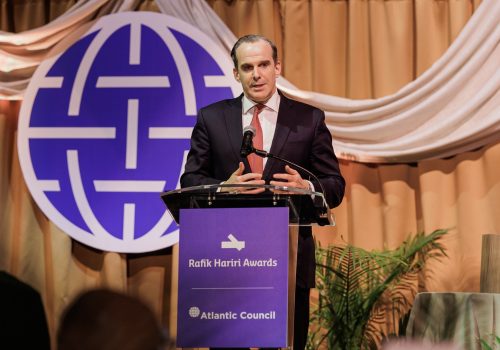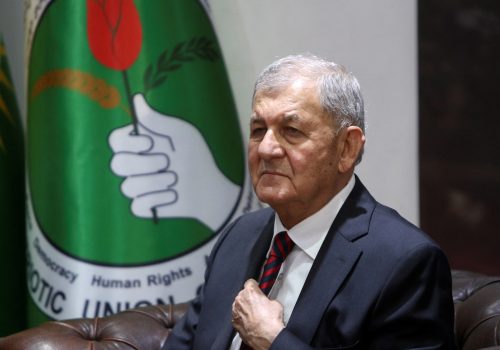Twenty years ago, I joined 160,000 of my closest friends to help invade Iraq. I then returned from 2004 through 2006 to help fight the insurgency. I continued to work with Iraqis and on Iraq policy after my last tour. Iraq became a permanent fixture in my life. But twenty years after the 2003 invasion, Iraq has been all but erased from the collective Western consciousness. That is frustrating for those, like me, who continue to work with Iraqis still in need of our support. Counterintuitively, this ebb of Western interest is also a symbol of relative success. Westerners who have been involved with Iraq through the invasion and in the difficult years that followed have pushed hard to help return Iraq to “normal country operations.” In other words, it would be good if Iraq to stabilized to the point that it no longer required exigent support.
Well, for better and for worse, “normal” has been achieved. Iraq is chaotic but relatively more stable than it has been in many years. It is a messy and sometimes violent, but nonetheless functioning, democracy. Iraqis probably have a much greater say in their own lives today than they did under Saddam Hussein’s rule. Iraq does not pose a military threat to its neighbors. But reduced international interest in Iraq means it receives less assistance. Compared to even the late 2010s, there are fewer military advisors and diplomats on the ground helping the Iraqis build and sustain their security forces, government institutions, and civil-society organizations. The Islamic State is a latent but still powerful threat. Iran, China, and Russia are filling the vacuum left by the West in ways that are inimical to Western policy goals.
Perhaps the worst part of this collective disinterest in Iraq is that disinterest has morphed into collective amnesia. For many in the West—including policymakers and military officers—Iraq was a bitter experience best forgotten. After “Iraq,” only the words “counterinsurgency” and “Afghanistan” are less welcomed in the halls of policy. Of course, from a rational perspective, it is counterproductive to forget about Iraq, even while Russia’s war in Ukraine dominates the headlines and competition with China soaks up all residual policy interest. As someone who still thinks about the past and present in Iraq, I offer a few lessons that may have broader policy relevance:
1. Just because the United States did something poorly does not mean it was a failure or that it should never be done again.
The occupation of Iraq went poorly. Pre-war planning discounted the enormous challenges that would follow the destruction of the Iraqi government. Coalition ground forces were completely unprepared for post-invasion duties. Tens of thousands had to adapt, and those of us serving on the ground did our best to help stabilize Iraq. Together with the Iraqis, we achieved some success. Iraq in 2023 is no Hanging Gardens of Babylon, but it could have been far worse. If we had better prepared to help the Iraqis in 2002, it could have gone better. At least a modicum of stability could have been achieved sooner. And while the United States’ track record of replacing dictators and violent theocracies with functioning democracies is not great, it is illogical to equate inadequate planning and performance alone with the idea that either democratization or counterinsurgency are inherently bad concepts.
2. Expectation management can make or break a war.
When a battalion of US Marines landed in Da Nang, South Vietnam, in 1965, Americans had no expectation that the United States would have to deploy hundreds of thousands of troops and see 58,000 of them get killed over the next decade. When the United States invaded Afghanistan in 2001 and quickly roped in its European allies, it did so with the explicit expectation of immediate withdrawal, not to fight a twenty-year insurgency. And when the US-led coalition invaded Iraq in 2003, it also did so with a plan for almost immediate withdrawal, not another twenty-year commitment. In each of these cases—Vietnam, Afghanistan, and Iraq—a primarily US failure to foresee and then set expectations for long-term commitment eroded both the United States’ and its allies’ will to fight. Better expectation management up front can help sustain political will for the patient, persistent presence needed to succeed.
3. Patient, persistent presence can pay off.
While coalition governments and senior planners neither foresaw nor desired a long war in Iraq, thoughtful leaders on the ground almost immediately realized the need for a stable and enduring commitment. Coalition forces had to give the Iraqis space and time to untangle the post-Saddam mess into which they had been thrust. Coalition officials began employing the phrase “patient, persistent presence” at least as early as 2004, and probably even 2003. This was a concise recognition of the empirical evidence showing that counterinsurgency takes time. It was also an acknowledgment—one that the Iraqis needed to know, not just hear—that we were going to stay to help. When we wavered, like we did from 2003 to 2006 and again in 2011, things got worse. When we firmly demonstrated our commitment, like we did in 2007 and 2014, things generally got better. Coalition presence was no panacea, but if we had been consistently patient, we could have saved more lives.
Now, twenty years have passed since the invasion. The Eye of Sauron—a facetious Tolkienian nickname for the myopic and fickle US foreign-policy gaze—has shifted away from the Middle East, at least for now. Counterinsurgency training is all but gone from training syllabi, for now. Many Americans have collectively bought into the poorly crafted lie that the Islamic State has been defeated, for now. I fear that at some point, this myopia will come back to bite Americans in our collective rear ends. So, I add here one more point:
4. If the United States is going to avoid making the same mistakes it made in Vietnam, Afghanistan, and Iraq, it needs to find a way to better balance its global policies and resources.
As much as the dwindling core of Iraqophiles love talking about our beloved second home, none of us look forward to the day when we gray-haired experts are called in to help the next generation of Western policymakers figure out how they can avoid their own fast-moving mess.
Ben Connable is a nonresident senior fellow with the Atlantic Council’s Middle East Programs and a retired Marine Corps Middle East area and intelligence officer with extensive experience in Iraq and the broader region.
Further reading
Fri, Mar 17, 2023
How the war in Iraq changed the world—and what change could come next
MENASource By
Our experts break down how this conflict has transformed not only military operations and strategy, but also diplomacy, intelligence, national security, energy security, economic statecraft, and much more.
Wed, Feb 15, 2023
Brett McGurk sets out the ‘Biden doctrine’ for the Middle East
Transcript By
In a keynote speech at the Atlantic Council's Rafik Hariri Awards, the White House Coordinator for the Middle East and North Africa explains the Biden administration's strategy in the region.
Mon, Nov 7, 2022
Iraq lacks strategy on many governance fronts. It’s never too late to rectify this unforgivable deficiency.
MENASource By Abbas Kadhim
Post-2003 Iraq has shown a gross lack of strategy on many governance fronts. It’s never too late to rectify this unforgivable deficiency.
Image: FILE PHOTO: A U.S. Marine Expeditionary Unit (MEU) Fox Company "Raiders" truck makes its way from the port of Umm-Qasr in southern Iraq to a port facility in near the town Az-Zubayr, south of Basra as two camels walk across the road, Iraq March 24, 2003. REUTERS/Desmond Boylan/File Photo SEARCH "20TH ANNIVERSARY OF U.S INVASION OF IRAQ" FOR THE PHOTOS



